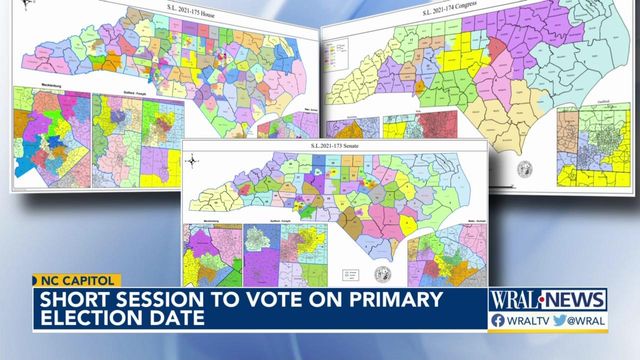NC Republicans to vote on whether to further delay primary elections
The proposal is expected to eliminate runoffs and aims to let Republicans control their own destiny in redrawing voting maps if the Supreme Court strikes the current ones down
Posted — UpdatedThe move, announced Monday by Senate Republicans, aims to boost the party’s control over the process of drawing congressional and legislative maps if the state Supreme Court decides next month to strike down new voting maps the GOP put in place last fall.
Under the proposal announced Monday, the election would be held on June 7.
State law requires the legislature have at least two weeks to draw new boundaries if a court strikes down ones currently in place. Because the Supreme Court is hearing the case Feb. 2 and the state Board of Elections has said drawing needs to be finished by the week of Feb. 14 under the current schedule, Republicans worried “an extremely short timeframe” could cause “unnecessary confusion and chaos.”
State Sen. Ralph Hise, a western North Carolina Republican who helped lead the redistricting process and is among those listed on lawsuits filed by voting rights groups, said in a statement that the primary delay would also give potential candidates more time to decide whether to seek elected office in possible new districts.
The plan is also likely to prolong an already bitter GOP primary for U.S. Senate between former Gov. Pat McCrory, U.S. Rep. Ted Budd and former Rep. Mark Walker. Walker remains in the race but has spent the past month mulling a potential U.S. House bid for a Greensboro-area seat.
Pat Ryan, a spokesman for Senate leader Phil Berger, said “the bill will not contemplate a runoff election,” meaning that whichever primary candidate captures a plurality of votes will win their party’s nomination and be able to compete in the general election. He said the bill language is not yet finalized and that the plan for no runoffs is still subject to change.
Under the current election schedule, candidates must get 30% of the vote to secure their party’s nomination. The 30% threshold may not be attainable in crowded primary contests.
The GOP-controlled House and Senate last fall passed maps highly advantageous to Republicans. The legislative boundaries make it easier for the party to regain supermajorities, thus allowing GOP lawmakers to turn bills into law without the support of Democratic Gov. Roy Cooper. In a state that is nearly evenly split politically, the congressional map is likely to give Republicans 10 or 11 of the 14 U.S. House seats up for grabs.
Jordan Monaghan, a spokesman for Cooper, said in a statement that lawmakers "should avoid additional attempts to undermine the voting process."
If the Supreme Court has an evenly split decision or sides with Republicans, the current maps will stand. If the court sides with voting rights groups arguing the maps violated the state constitution because they were drawn for pure partisan gain and to dilute the voting power of racial minorities in a way that stifles free and fair elections, then Republican state lawmakers could see an increased likelihood of the Supreme Court drawing new maps itself by citing time constraints.
Monday’s announcement from Hise reduces the likelihood of the court ordering maps to be crafted outside the Republican-controlled General Assembly.
Related Topics
• Credits
Copyright 2024 by Capitol Broadcasting Company. All rights reserved. This material may not be published, broadcast, rewritten or redistributed.






